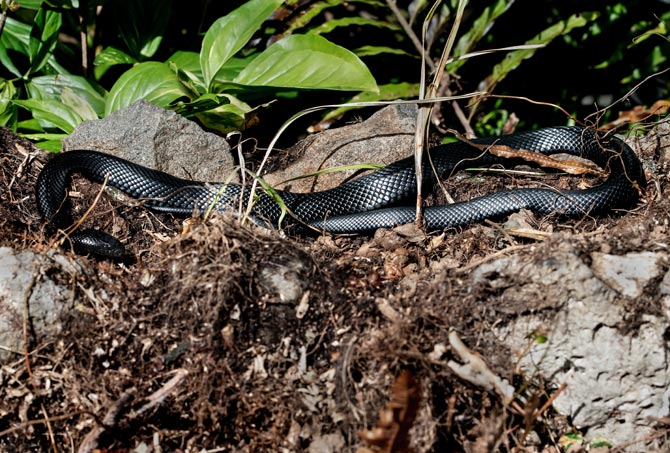Australia is home to countless venomous snakes. So it’s not too surprising that snake bites in dogs are fairly common. Brown, tiger and black snakes are responsible for the majority of snake bites in dogs, with most bites occurring in rural areas (78%) in comparison to urban settings (22%).
Of course, snake bites aren’t just common in dogs—cats can fall prey to snakes too. However, research shows that cats are more likely to survive a snake bite when compared to dogs. Indeed, the results of a survey sent to veterinary surgeons in Australia (Mirtschin,1998) revealed 91% of cats and 75% of dogs survived following the administration of anti-venom. Yet 68% of cats and only 31% of dogs survived without the anti-venom.
Research into this disparity by the University of Queensland found that it is the fact dogs’ blood clots more quickly than cats’ that put them at greater risk. In an article in The Brisbane Times, lead researcher Associate Professor Bryan Fry explains that while the dog’s ability to form blood clots quickly may have been useful in the wild, it makes dogs more vulnerable to snakes that promote blood clotting in their venom. Indeed, one of the most frequently encountered snakes is the Eastern Brown, whose venom does indeed promote blood clotting.
Supporting the SnakeMap Project
The SnakeMap Project, a first-of-its-kind initiative from Veterinarians at the University of Melbourne, aims to help predict, prevent and diagnose snake bites in dogs and cats.
Since the Project launched in 2017, vets all over Australia are invited to upload information regarding where pets are bitten, what treatment they receive and how they responded. The collected data can then be used as a medical resource for Aussie vets.
Already notable trends have emerged, which can be useful for vets and pet owners alike. For example, data suggests that snake bites in dogs are more likely to happen in pet owners’ backyards. Furthermore, Staffordshire Bull Terriers and Jack Russell’s are amongst the breeds most commonly bitten.
The more veterinarians that contribute to the SnakeMap Project, the greater and more useful the insights will be. Veterinarians are invited to register their interest to contribute to SnakeMap via https://redcap.vet.unimelb.edu.au/surveys/?s=C98E4JR9CK.
The long-term plan is to make SnakeMap accessible to pet owners, so they can have up-to-date and accurate information about snakes in their area.
Avoiding snake bites in dogs: advice to give pet owners
Australia is home to countless deadly snakes, so it pays for pet owners to be aware of the risk to their pets. Pet professionals play a critical role in reminding owners that spring marks the beginning of snake bite season. You can also offer a few tips on avoiding a potentially fatal snake bite.
- Refrain from allowing dogs to be off the lead in the bush or long grass, especially near water such as beaches and lakes.
- Perform a garden clean up. Cut long grass and clear away and piles of materials, as these are areas a snake may take shelter.
- Consider installing a snake-proof fence.
- If an owner discovers a snake in their garden they can wait to see if the snake moves on or contact a licensed reptile handler to remove it.
- Highlight the importance of pet insurance to cover the cost of treatment.
- Recommend pet owners clue up on the signs of a snake bite—weakness and collapse, vomiting, blood in urine, twitching muscles, paralysis.
- Remind owners the sooner they seek treatment for their dog, the greater the chance of survival.
Snake bites in dogs: emergency care
Snakes are at their most venomous when they first emerge from hibernation, as their venom glands are full. As such, symptoms can progress extremely quickly.
Advise pet owners to seek immediate medical attention for their pets if they suspect a snake bite. Other recommend steps include:
- Keep the dog as still as possible
- Firmly apply a bandage over the bite site. DO NOT apply a tourniquet or wash the wound.
- If you can describe the snake this information may prove useful for the vet.
Has a dog in your care been bitten by a snake? What action did you take and what was the outcome? We’d love to hear your insights; simply post in the comments box below.
Information sources:
- Mirtschin, PJ. Snake bites recorded by veterinary practice in Australia. Aust Vet Journal. 1998: 76, P 195-198.
- Layt, S. Dogs twice as likely to die from snake bite as cats. Research finds. Brisbane Times. May 2020.
- RSPCA South Australia. Snake bite warning for pet owners as mercury rises. Sept 2019. https://www.rspcasa.org.au/snake-bite-warning/
Latest posts by Liz Walden (see all)
- Pet health: Medicinal cannabis for pets - December 27, 2021
- What pet business insurance do I need? - November 17, 2021
- Pet sitters: how to take time off - November 15, 2021










Thank you for the info on this important matter!!